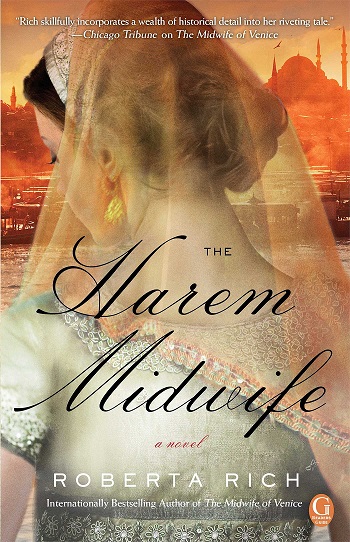Book Review: The Harem Midwife by Roberta Rich
The Harem Midwife by Roberta Rich (Published by Doubleday Canada)
Reviewed by Saima Hussain
NORMALLY one is sceptical of any novel that includes the word ‘harem’ in its title or the cover blurb. Licentious princes, lascivious maids, loquacious slaves … yawn. Same old, same old. But in the case of The Harem Midwife an exception had to be made.
As the much-anticipated sequel to Roberta Rich’s debut historical novel, The Midwife of Venice, it continues the story of Hannah Levi, the Jewish midwife who escaped plague-ridden 16th-century Venice and its oppressive ghetto with her husband, Isaac, and their adopted son, Matteo. Carrying little more than Isaac’s silkworms and Hannah’s birthing spoons they arrive in Constantinople, the magnificent capital of the glorious Ottoman Empire and the greatest city in the world at the time. Here they face no repression; they can live anywhere they want and Hannah is not required to wear a red headdress to signify her faith. Yes, Jews here pay a head tax, Isaac admits, “But they are free to practice any profession, own any type of business, and buy property.”
In Venice, the law prohibited Hannah, on pain of death, from assisting Christian women. But in Constantinople her expertise brings her to the attention of the royal palace and she is appointed midwife to the harem of Sultan Murat III, the “Sultan of Sultans, God’s Shadow on Earth, Supreme Ruler of the Mediterranean and the Black Seas, the Balkans and Anatolia, Azerbaijan, Damascus, Aleppo, Egypt, Mecca and Medina, Jerusalem, all the Arab dominions, and Yemen.”
This all-powerful Sultan has a problem: he has no healthy male heir. His young son has been sick for some time and is not expected to live to adulthood. The Sultan’s beloved wife Safiye has produced two daughters but no more sons and time is not on her side. Neither is the Valide Nurbanu, the powerful queen mother, who is determined to see her son freed from his wife’s exclusive hold and reproducing at a much faster rate. Despite the Valide’s efforts to fill the zenana with the prettiest concubines and most voluptuous odalisques, the Sultan will look at no woman but Safiye.
But suddenly there is a ray of hope. The Sultan notices a young girl just as she was being brought into the Palace and instantly falls in lust. Her name is Leah and she comes from a long line of mountain-dwelling Jews in the tribal region Circassia. Hannah is summoned to examine the girl to ensure that she is suitable for the Sultan’s couch. If not suitable, she will be sold to any one of the city’s brothels.
So while Mustafa, the head eunuch, waits to log intimate details in the official Book of Couchings and the Valide looks forward to the babies that “will be raining from the heavens, filling dozens of cradles,” the midwife struggles to find a way to save “this daughter of Israel.”
Danger, though, abounds not only in the palace but also in Hannah’s humble abode due to the arrival of a beautiful woman who claims to be the wife of Isaac’s recently deceased brother, Leon. The widow, Grazia, has come to collect the hundred ducats Isaac owed his brother. Since Isaac and Hannah are unable to pay the debt, a Rabbi is invited to resolve the issue. The Rabbi, however, points out that there is a much bigger issue at play.
Ancient Jewish law dictates that a childless widow is automatically considered married to her deceased husband’s brother. In the Book of Deuteronomy it is stated “that a brother-in-law is married to his brother’s widow, if the brother dies without heirs.” Furthermore, “it is the duty of the deceased man’s brother to ‘go into the widow’ and perform the duty of a husband. And if a son is born to her, then the child shall be named after the deceased brother.” So according to the law of levirate marriage, Isaac and Grazia are man and wife.
Hannah is outraged. Muslims are allowed more than one wife, not Jews, she exclaims. The Rabbi is unmoved: “Here in Constantinople we follow the teachings of Rabbi Eliyahu Mizrahi of Saintly Seed who allowed such unions. In Constantinople a Jew can have more than one wife.” Even more worrisome for Hannah is the fact that Isaac is not distressed at the Rabbi’s revelation.
This well-researched historical novel clearly illustrates how a woman, whether queen or commoner, had to rely on her own good sense and perseverance in order to succeed.
It is no surprise that the most outstanding feature of the novel is the midwife herself. Hannah is a strong-willed and generous woman who endeavours to help others even if it means putting her own life at risk. Brave and passionate, she expresses her emotions freely, whether it is anger at the Rabbi or frustration with Osmanlica, the language of the Turks: “Once, in the midst of a quarrel, Hannah screamed at him that Osmanlica sounded like glutinous maize soup bubbling over a camel-dung fire. Isaac had laughed until tears ran down his cheeks.”
And despite all the freedoms she now enjoys, Hannah candidly admits that she misses the ghetto, especially “the smell of cooking — sardines in brine, baby artichokes fried in garlic, bread and pudding.” She finds it hard to feel at home in this new city, where even her fellow Jews seem like strangers: “The Sephardim, the Jews from Spain and Portugal, were more relaxed, more sensual, more refined and less learned than the Ashkenazi from Eastern Europe. They had names that did not even sound Jewish, like Spinoza, Cardozo, and Mendoza.”
An equally powerful and memorable character is the Valide Nurbanu. She entered the harem as a 12-year-old concubine, but through luck and intelligence has grown to such a powerful position that through a network of spies she stays informed about everything that goes on inside the harem and even across the Empire. Rather than being enemies, the midwife and the queen mother respect each other, not least because of their shared Venetian language.
The author deserves credit for not giving in to the lure of Orientalism while presenting the Ottoman Empire. There are some harem scenes involving orange blossoms, red sherbet, and jewelled brocades in which alarm bells start to ring, but on the whole the descriptions are balanced and give a real sense of the political intrigues and dynastic concerns that dominated harem life.
The Harem Midwife boasts good writing, an entertaining plot, and two strong female characters, but it doesn’t quite hit the same chord as the first book. Still a definite page-turner, it is missing the heart-stopping pace and constant intrigue that made Hannah’s previous adventures such a pleasure to read. And ironically, this is due mainly to the escape from Venice.
In Venice, Hannah lived in constant danger. If the authorities, who forbade Jews from treating Christians, had seen her birthing spoons she would have been declared a witch and tortured to death. In contrast, no one in Constantinople views her with suspicion or considers her work to be sinister. She is free to assist any woman who needs her. Also, the Turks take no exception to the birthing spoons because they see them for what they are: the tools of her trade.
The relative security that the Ottoman capital affords to Hannah Levi, the midwife, does no favours to Roberta Rich, the storyteller.
*This review was originally published in DAWN, February 27, 2014 www.dawn.com


